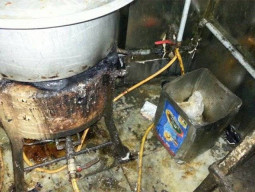
One of the key demands is for them to be eligible for Pakistani Computerised National Identity Cards or CNICs. This would allow them to vote and apply for passports.
Hundreds of men, women and children arrived in buses, cars and motorcycles and many on foot to converge at Quaid-e-Azam’s mazaar before heading towards Tibet Centre on MA Jinnah Road, the city’s main artery and traditional venue for such public demonstrations. The crowd carried Pakistani flags alongside placards printed with slogans against several government authorities responsible for population identity management such as the National Aliens Registration Authority.
One read, “FIA, NADRA badmashi khatam karo” or ‘End the hooliganism of the Federal Investigation Agency and National Database and Registration Authority’. Another demanded rights for the people who had lived in Pakistan for 41 years.
The men leading the rally claimed that the three million Bengalis who live in Karachi are treated as second or third class citizens by the authorities and are persecuted or neglected by the government. Up to 17% of them do not have CNICs and are not eligible to vote as a result. The committee’s chairman, Sheikh Mohammad Feroz, said that when they apply for a CNIC or passport, officials immediately recognise them as people of Bengali origin because of their facial features and accents and start to harass them.
In 1971, East Pakistan became the independent country of Bangladesh, but simmering prejudices and biases persist in the government machinery against Bengali-speaking people. While many Bangladeshis come to work in Pakistan, mostly under the table, many families have laid their roots here and their children were born in Karachi.
The protesters demanded a permanent solution and said they would tolerate no more delays as the elections are around the corner. Even when they show the proper documents, there is no guarantee that they will be issued a CNIC or passport as many officials just say their papers are fakes. Usually this problem is solved with a bribe of around Rs10,000 for a CNIC and Rs25000 for a passport, they cried.
“We were Pakistanis and will always be Pakistanis,” cried Feroz while shouting the slogan, ‘Pakistan zindabad’ or ‘Long live Pakistan’. “The government should learn a lesson from this rally and stop treating us badly otherwise we will shut Karachi down.”
It seemed, however, that the Pakistani Bengali Action Committee is unlikely to muster enough strength to act independently in the elections. This would perhaps explain why Feroz announced their unconditional support for the Muttahida Qaumi Movement (MQM) in the forthcoming polls. While the MQM now considers itself a national party, Karachi is widely seen as its political base and it started out as a party to protect the rights of disenfranchised Urdu-speaking migrants from India at the time of Partition.
The MQM has done some work to support the Bengali action committee though. “Quaid-e-Tehreek Altaf Hussain bhai is our leader,” declared Feroz. “And the three million Bengalis are with him. Altaf bhai certified us as patriots, now we don’t need anyone else’s approval.”
A young Jabbar who came to the rally lamented that even though third-generation Bengali-speaking people were living in Pakistan, they were not considered sons of the soil. “I was born here and will die here, so why am I not considered a Pakistani,” he asked.
Published in The Express Tribune, January 9th, 2012.

















COMMENTS
Comments are moderated and generally will be posted if they are on-topic and not abusive.
For more information, please see our Comments FAQ